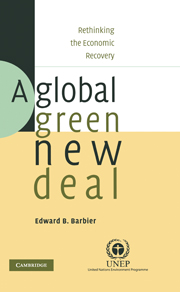Book contents
- Frontmatter
- Contents
- List of figures
- List of tables
- List of boxes
- Foreword
- Preface
- Acknowledgements
- Part I Why a Global Green New Deal?
- Part II The Key Components of a Global Green New Deal
- Part III The Role of the International Community
- 6 Promoting global governance
- 7 Facilitating access to finance
- 8 Enhancing trade incentives
- 9 Conclusion: international priorities for a Global Green New Deal
- Part IV Towards a Greener World Economy
- Appendix 1 PIIE–WRI analysis of a green recovery program for the United States
- Appendix 2 Pew comparative analysis of clean energy jobs and investments in the United States, 1998–2007
- Glossary
- Index
- References
7 - Facilitating access to finance
Published online by Cambridge University Press: 05 June 2012
- Frontmatter
- Contents
- List of figures
- List of tables
- List of boxes
- Foreword
- Preface
- Acknowledgements
- Part I Why a Global Green New Deal?
- Part II The Key Components of a Global Green New Deal
- Part III The Role of the International Community
- 6 Promoting global governance
- 7 Facilitating access to finance
- 8 Enhancing trade incentives
- 9 Conclusion: international priorities for a Global Green New Deal
- Part IV Towards a Greener World Economy
- Appendix 1 PIIE–WRI analysis of a green recovery program for the United States
- Appendix 2 Pew comparative analysis of clean energy jobs and investments in the United States, 1998–2007
- Glossary
- Index
- References
Summary
If enacted, the international actions and reforms advocated in the previous chapter should facilitate the global financing and technology transfer necessary for the GGND. Problems will remain, though, in access to finance globally.
One difficulty is the decline in private financial investment flows compared to pre-recession levels. A major reason for this ongoing problem is the lack of confidence in the international financial system, coupled with the worldwide contraction of credit as the global economy adjusted to rid the system of overvalued and bad assets. The global financial system suffered a near-meltdown in 2008, and, although the massive bailout of the global financial system may have averted a major catastrophe in world credit and capital markets, it has proved insufficient to avoid the worst international economic crisis since the Great Depression. Not surprisingly, private financial investment flows have suffered accordingly, and this has led to demands for a new framework for the global financial system.
At the April 2009 London summit, the G20 suggested a number of proposals to shore up confidence in the international financial system and to reduce the risk of further financial turmoil of the type that precipitated the current recession. These proposals include the following.
Strengthening financial supervision and regulation to include hedge funds and credit rating agencies, and eliciting more information on tax havens.
Extending the mandate of the Financial Stability Board (formerly the Financial Stability Forum), which has the responsibility of overseeing global financial stability and risk.
Tripling the lending capacity of the International Monetary Fund, and endorsing the IMF's recent lending initiatives to make substantial amounts of finance available quickly to emerging market economies during a crisis.
[…]
- Type
- Chapter
- Information
- A Global Green New DealRethinking the Economic Recovery, pp. 190 - 200Publisher: Cambridge University PressPrint publication year: 2010



